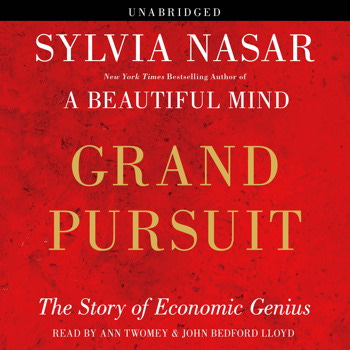Grand Pursuit
Sylvia Nasar's Grand Pursuit: The Story of Economic Genius brings to life most of the leading economic thinkers of the nineteenth and twentieth century. The Industrial Revolution, for example, inspired Charles Dickens, in contrast to Carlyle and Mill who were pessimistic about the progress of the new industrial society, to write that "we have risen slowly, painfully, and with many a hard struggle out of all this social degradation and ignorance". This was the shocking realisation of the mid-nineteenth century: that you could improve your own material condition, and so could your children, and their children. Improvement. Progress. Prosperity. Alfred Marshall offered an explanation for this continued improvement: productivity growth. But economic growth was not enough; poverty was the main concern. Beatrice Webb (nee Potter), a surprising but no less interesting inclusion, argued for government to intervene through social programmes. Keynes, Fisher, Hayek, Galbraith, Robinson and Schumpeter all feature prominently, their ideas influenced by the extraordinary events of the first half of the twentieth century. Paul Samuelson and Amartya Sen are the most recent economists included, although their stories are distinctly less detailed, less passionately written, and less integrated into the global economic changes. A case could be made for including more of the recent economic thinkers like Milton Friedman, or Paul Krugman, or even Joseph Stiglitz. But perhaps that is an entirely different book. As it is, this is an entertaining story about individuals who've shaped the world we live in, and continue to do so, even long after they are gone. They all share at least one common characteristic: their experiences of the world compelled them to, first, understand it, and second, do something about it. That should be an inspiration to all of us.


